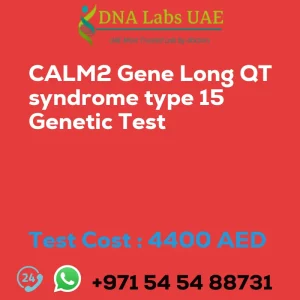DBH Gene Dopamine beta-hydroxylase DBH deficiency Genetic Test
Test Name: DBH Gene Dopamine beta-hydroxylase DBH deficiency Genetic Test
Components: DBH gene analysis for mutations or variations
Price: 4400.0 AED
Sample Condition: Blood or Extracted DNA or One drop Blood on FTA Card
Report Delivery: 3 to 4 Weeks
Method: NGS Technology
Test type: Cardiovascular Pneumology Disorders
Doctor: Cardiologist
Test Department: Genetics
Pre Test Information: Clinical History of Patient who is going for DBH Gene Dopamine beta-hydroxylase (DBH) deficiency NGS Genetic DNA Test. A Genetic Counselling session to draw a pedigree chart of family members affected with DBH Gene Dopamine beta-hydroxylase (DBH) deficiency NGS Genetic DNA Test gene DBH
Test Details
The DBH Gene Dopamine beta-hydroxylase (DBH) deficiency NGS Genetic Test is a genetic test that analyzes the DBH gene for mutations or variations that may cause DBH deficiency. DBH deficiency is a rare genetic disorder characterized by a lack of the enzyme dopamine beta-hydroxylase, which is responsible for converting dopamine to norepinephrine in the body.
This test utilizes next-generation sequencing (NGS) technology to analyze the entire DBH gene, allowing for the detection of various types of genetic changes, including small point mutations, insertions, deletions, and larger structural variations. By identifying these genetic changes, the test can provide a diagnosis for individuals suspected of having DBH deficiency.
The test typically involves collecting a DNA sample, usually through a blood sample or saliva sample, from the individual being tested. The DNA is then sequenced using NGS technology, and the resulting data is analyzed to identify any genetic variations in the DBH gene.
The DBH Gene Dopamine beta-hydroxylase (DBH) deficiency NGS Genetic Test can be helpful in confirming a diagnosis of DBH deficiency, which can aid in the management and treatment of affected individuals. It can also be used for carrier testing in individuals with a family history of DBH deficiency or for prenatal testing in couples at risk of having a child with the condition.
It is important to note that this test is typically performed by a specialized laboratory or genetic testing facility and should be ordered and interpreted by a healthcare professional with expertise in genetics. Genetic counseling may also be recommended before and after testing to help individuals understand the implications of the test results and make informed decisions.
| Test Name | DBH Gene Dopamine beta-hydroxylase DBH deficiency Genetic Test |
|---|---|
| Components | |
| Price | 4400.0 AED |
| Sample Condition | Blood or Extracted DNA or One drop Blood on FTA Card |
| Report Delivery | 3 to 4 Weeks |
| Method | NGS Technology |
| Test type | Cardiovascular Pneumology Disorders |
| Doctor | Cardiologist |
| Test Department: | Genetics |
| Pre Test Information | Clinical History of Patient who is going for DBH Gene Dopamine beta-hydroxylase (DBH) deficiency NGS Genetic DNA Test. A Genetic Counselling session to draw a pedigree chart of family members affected with DBH Gene Dopamine beta-hydroxylase (DBH) deficiency NGS Genetic DNA Test gene DBH |
| Test Details |
DBH Gene Dopamine beta-hydroxylase (DBH) deficiency NGS Genetic Test is a genetic test that analyzes the DBH gene for mutations or variations that may cause DBH deficiency. DBH deficiency is a rare genetic disorder characterized by a lack of the enzyme dopamine beta-hydroxylase, which is responsible for converting dopamine to norepinephrine in the body. This test utilizes next-generation sequencing (NGS) technology to analyze the entire DBH gene, allowing for the detection of various types of genetic changes, including small point mutations, insertions, deletions, and larger structural variations. By identifying these genetic changes, the test can provide a diagnosis for individuals suspected of having DBH deficiency. The test typically involves collecting a DNA sample, usually through a blood sample or saliva sample, from the individual being tested. The DNA is then sequenced using NGS technology, and the resulting data is analyzed to identify any genetic variations in the DBH gene. The DBH Gene Dopamine beta-hydroxylase (DBH) deficiency NGS Genetic Test can be helpful in confirming a diagnosis of DBH deficiency, which can aid in the management and treatment of affected individuals. It can also be used for carrier testing in individuals with a family history of DBH deficiency or for prenatal testing in couples at risk of having a child with the condition. It is important to note that this test is typically performed by a specialized laboratory or genetic testing facility and should be ordered and interpreted by a healthcare professional with expertise in genetics. Genetic counseling may also be recommended before and after testing to help individuals understand the implications of the test results and make informed decisions. |








